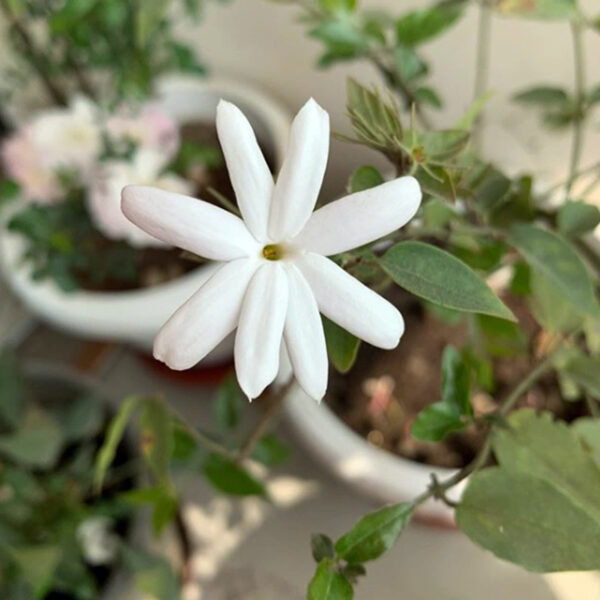1. Botanical Information:
- Scientific Name: Jasminum auriculatum
- Common Names: Indian Jasmine, Juhi
- Family: Oleaceae
- Genus: Jasminum
2. Description:
- Jasminum auriculatum is a woody, evergreen vine or shrub that can grow up to 3-4 meters (10-13 feet) in height.
- The leaves are dark green, opposite, and pinnate with 5-7 leaflets.
- The most distinctive feature of this plant is its highly fragrant, small, tubular, white flowers, which are about 1-1.5 cm in diameter.
- The flowers are typically borne in clusters and have a sweet, intense scent, especially in the evening and at night.
- The plant blooms profusely during the summer and early autumn months.
3. Geographic Distribution:
- Jasminum auriculatum is native to India and is found in various regions across the Indian subcontinent.
- It is commonly cultivated in gardens and as ornamental plants in tropical and subtropical regions worldwide.
4. Cultivation:
- This jasmine species prefers well-drained soil with good organic content.
- It thrives in full to partial sunlight.
- Regular pruning helps maintain its shape and encourage more flower production.
- It is often grown as a climber on trellises, fences, or as a hedge.
- Propagation can be done through cuttings.
5. Uses:
- Ornamental: Jasminum auriculatum is primarily cultivated for its fragrant flowers, making it a popular choice for gardens, courtyards, and balconies.
- Perfumery: The essential oil extracted from its flowers is used in the perfume industry for its sweet, floral fragrance.
- Traditional Medicine: In traditional medicine systems, various parts of the plant are used for their medicinal properties. For example, the leaves are used for treating wounds and skin disorders, while the flowers are used in herbal remedies.
6. Cultural Significance:
- In India, the fragrant blooms of Jasminum auriculatum are commonly used in religious ceremonies, weddings, and other auspicious occasions.
- The flowers are often strung into garlands and used as offerings in temples and as decorations.
- The sweet scent of the flowers is associated with purity and love in Indian culture.
7. Other Notes:
- Jasminum auriculatum is closely related to other jasmine species, including Jasminum sambac (Arabian Jasmine) and Jasminum officinale (Common Jasmine).
- It is important to note that while the flowers are highly fragrant, some people may be sensitive to the scent.
Jasminum auriculatum, with its beautiful and fragrant flowers, holds cultural and ornamental significance in various parts of the world, especially in South Asia. It is a versatile plant with both aesthetic and traditional uses.



